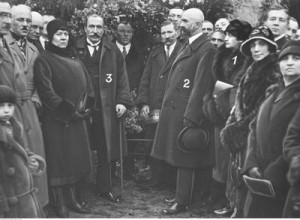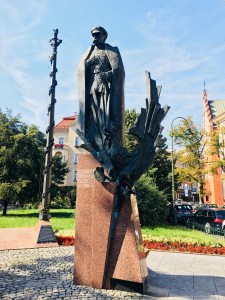Revolution
“Somewhere out there, the telephone appeared. The phonograph began eternalising voice. The electric lightbulb spread rapidly (…). The typewriter became widespread. Bolesław Prus was apparently the first to use it; he was also a pioneer of cycling (…). The American engineer Maxim replaced the clunky, multi-barrel mitrailleuse with a simpler and more efficient construction: the heavy machine gun. People wrote that war was now impossible, that no infantry or cavalry attack could prevail against a mass attack by those monsters…”. This is how Józef Hen described the beginning of the 20th Century in his biography of Tadeusz Boy-Żeleński. The world was changing, but in partitioned Poland, marasmus reigned. In his Thoughts of a Modern Pole (1903), Roman Dmowski wrote: “Passivity is losing us, not just as a nation, but as individuals. It is the primary source of the frequent pessimism, hopelessness, and lack of confidence in oneself and in the possibility of living in a better way. The world needs to be known and understood, and life wrought according to one’s own requirements”. The chance to show activeness presented itself just two years later. As a result of its defeat in the war against Japan, revolution broke out in Russia, including the [Polish] lands under Russian rule. Russia’s defeat triggered enthusiasm in all three partitions of Poland. The nickname of writer Jalu Kurek, who is almost forgotten now, came from the battle of the river Yalu won by the Japanese (he later made it his official name). Defeats at sea (the Battle of Tsushima, where the Russian fleet was practically destroyed) and on land, as well as the outbreak of revolution, forced the Tsarist regime to make concessions. Reluctantly, Tsar Nicholas II agreed to the establishment of a parliament, the Duma, in which Poles led by Dmowski obtained a strong position. Yet the Duma was just a mock assembly; deputies could discuss, but not put forward any demands. Calls for autonomy for the Polish lands under Russian rule led to the tsar dissolving the third Duma; Dmowski and his National Democratic supporters did not make it into the fourth. Although Nicholas was a completely incompetent ruler (he himself admitted helplessly that he had never been taught the rules of governing), he staunchly maintained the old-style autocracy, which was already archaic. In this way, Dmowski’s policy of “banking on Russia” failed. The revolutionary policy of Józef Piłsudski, who preferred to link the Polish cause to Germany and the Austro-Hungarian monarchy, fared similarly. In 1905-1907, his Combat Organisation of the Polish Socialist Party (OB PPS) carried out hundreds of combat and terrorist operations, including attacks on prominent Russian officials. They also rescued prisoners and organised attacks to obtain money for weapons and party activity, most famously the Bezdany raid of 1908, in which the colossal sum of over 200,000 roubles was stolen from a courier train. Yet despite the OB PPS’s actions, Piłsudski ultimately had to hide in a safe place and wait for Russian repression to end. He sought refuge in the Austrian partition, establishing contact with the Habsburg monarchy’s intelligence service. In the Prussian partition, brutal germanisation was underway, symbolised by the crushing of the Września school strike, in which pupils protested having to study religion in German. Yet things began to change at the start of the 20th Century. Polish newspapers were published in Silesia and Wojciech Korfanty became the first Polish deputy in the Reichstag. It was no accident when Chancellor Bismarck said: “Poles are the hot iron in Germany’s side. But if need be, I will grab that iron and strike Russia with it.” At that time, Europe ultimately split into two vast military blocs: the Entente between Britain, France and Russia, and the Triple Alliance between Germany, Austro-Hungary and, up to a point, Italy. The world is always too small for two superpowers. Despite the machine guns, war turned out to be all too possible. It did not break out in 1911, following the Second Moroccan Crisis. But 1914 was approaching rapidly.
We should probably include his full name: Hiram Stevens Maxim
Jerzy Kotlarczyk
- strajk młodzieży szkolnej we Wrześni – budynek szkoły. Źródło: ze zbiorów Narodowego Archiwum Cyfrowego
- Organizacja Bojowa Polskiej Partii Socjalistycznej. Źródło: ze zbiorów Narodowego Archiwum Cyfrowego
- źródło: ze zbiorów Jagiellońskiej Biblioteki Cyfrowej
- Czwórka Legionowa w Krakowie (Foto. Fundacja Klubów „GP”)
- Pomnik Józefa Piłsudskiego w Krakowie (foto. Fundacja Klubów „GP”)
- Muzeum Czynu Niepodległościowego w Krakowie. Muzeum mieści się w Domu im. Józefa Piłsudskiego (foto. Fundacja Klubów „GP”)
- Muzeum Czynu Niepodległościowego w Krakowie. Muzeum mieści się w Domu im. Józefa Piłsudskiego (foto. Fundacja Klubów „GP”)
- Muzeum Czynu Niepodległościowego w Krakowie. Muzeum mieści się w Domu im. Józefa Piłsudskiego (foto. Fundacja Klubów „GP”)
- Muzeum Czynu Niepodległościowego w Krakowie. Muzeum mieści się w Domu im. Józefa Piłsudskiego (foto. Fundacja Klubów „GP”)
- Muzeum Czynu Niepodległościowego w Krakowie. Muzeum mieści się w Domu im. Józefa Piłsudskiego (foto. Fundacja Klubów „GP”)













